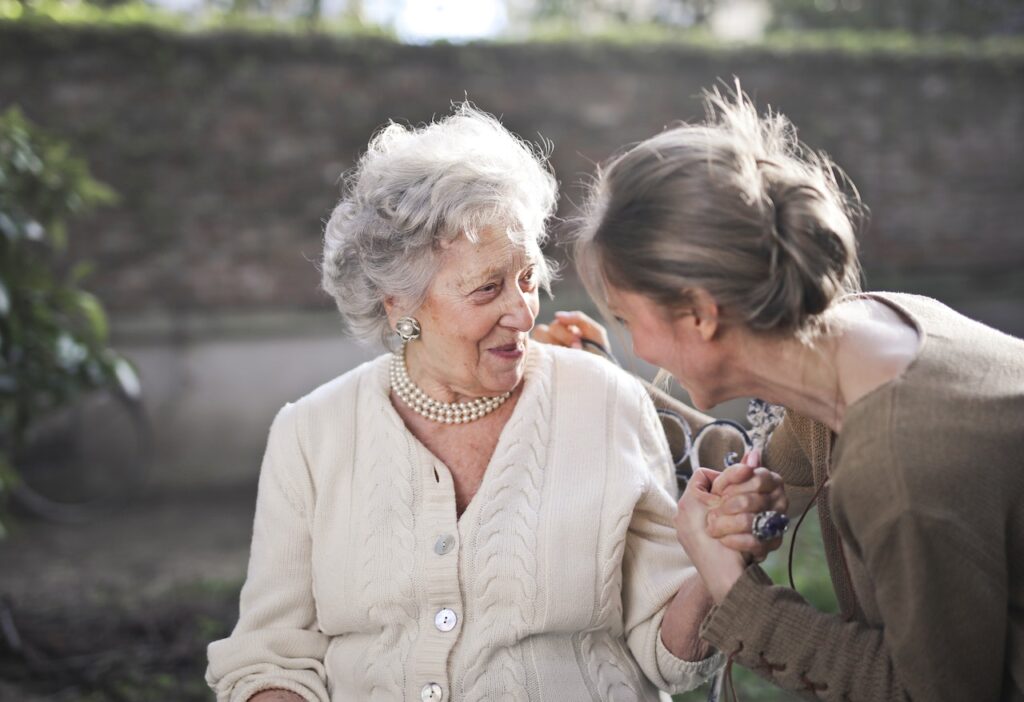Loneliness amongst the elderly is a long-term concern that’s growing steadily by the day. It’s estimated that 1.4 million elderly people in the UK, and 1 in 4 people over the age of 60 worldwide, experience loneliness. And that figure continues to rise year on year. The plight of elderly loneliness has more recently risen to the forefront of societal concerns, with many charities and support groups actively working to combat the rising cases of elderly loneliness, yet it continues to be a seemingly insurmountable problem.
Perhaps you’ve noticed that your elderly neighbour doesn’t get many visitors, or you’re worried that a parent, grandparent, or another elderly relative isn’t getting out very much. It’s a sad fact that elderly people can so easily fade into the background and become forgotten members of society. Living alone or without work, particularly if they aren’t very mobile these days, the opportunities for them to get out and about, meet other people, and take part in sociable activities get slimmer.
Loneliness can have a seriously detrimental effect on a person’s mental and physical health if left for long enough. For the elderly, where their physical wellbeing might already be a concern, loneliness can expedite any pre-existing health issues, as well as contribute to some more serious mental health conditions.
The impact of elderly loneliness on health
Loneliness is a lot more complex than simply feeling alone or isolated, and whilst this in itself is an unpleasant experience, the implications of loneliness for a person’s health can become very serious, very quickly. Over the more recent years, there has been a lot of research conducted to try to understand just how serious elderly loneliness can become.
Overall, it was concluded that social isolation of the elderly increases the risk of a person’s premature death, even beyond that of smoking and obesity. Unsurprisingly, loneliness showed a direct correlation with depression and associated negative emotions such as sadness, hopelessness, pain, and low self-worth. Prolonged loneliness can trigger depression even when there has been no prior history of a mental health condition or enhance pre-existing depression symptoms.
Loneliness also has a significant part to play in both causing or exacerbating dementia and Alzheimer’s disease. Dementia is one of the biggest threats to the elderly population and claims tens of thousands of lives each year. The number of those suffering from dementia has grown rapidly over the last ten-plus years, to almost double that of 2011. Studies showed that elderly people facing loneliness are 50% more likely to develop dementia.
But loneliness doesn’t just target a person’s mental health, their physical health can be in jeopardy too. A lack of social relationships amongst the elderly saw a 29% increased risk of heart disease and a 32% increased risk of suffering a stroke. Moreover, heart failure in elderly patients who struggled with loneliness saw a 4 times increased risk of death from their condition.
Signs of loneliness in elderly people
Knowing where to look out for elderly loneliness sounds simple, but picking up on it before it becomes a major concern, is the best way to counteract the negative implications. Without realising it, you could be extending their life.
Noticing a change in someone’s attitude or behaviour is typically a good indicator of elderly loneliness. You may notice they have become more quiet and reserved, and less inclined to interact with you or anyone else. In some cases, loneliness can manifest itself as hostility or aggression towards caregivers or family members trying to help. Unsavoury or hostile behaviour is usually a result of spending a lot of time alone without company. Unfortunately, this type of behaviour tends to do more harm than good and can repel those trying to help out. But stick with it.
Keep an eye out for your neighbours or friends around town. If you realise you haven’t seen your elderly neighbour for a while, it could be time to check in on them and make sure they’re doing ok. Alternatively, if you start to notice that simple tasks like picking up the post or taking the bins out hasn’t been happening, this is another good indicator that someone might be suffering from loneliness. Like most depression conditions, even the simplest and most menial tasks can become overwhelming, so keep note of things like that so you know when an intervention might be necessary.
What you can do to help combat elderly loneliness
Loneliness amongst the elderly is a serious situation that charities and other groups are trying their hardest to combat, but it needs all the help it can get from people like you. Even something as simple as offering up a smile to an elderly person on the street can brighten their day. Here are a few ways that you can do your bit to help fight elderly loneliness and bring some light to a senior person’s life.
Start a conversation. It can be difficult to know who and when to help, but engaging in little conversations at the bus stop, in the supermarket, or on the street for example means that you are doing your bit to support the elderly population. You might be the first or only person they speak to that day, it won’t take up much of your time, but it can make all the difference for them. Be patient if you think they are having trouble hearing you, speak clearly, and allow them a little extra time to understand and respond. Whatever you do, just don’t shout!
Offer a helping hand. For the elderly, simple household tasks can become more of a marathon. Particularly for those who are less mobile or living alone, activities like unloading the shopping, posting mail, or picking up prescriptions can be difficult. Offer to accompany them, give them a lift, or do their jobs for them if you’re already heading out. Quite often, a senior person will go without basic necessities if they can’t acquire them themselves instead of reaching out for help, so offering to assist them can make the difference between an elderly person having what they need and suffering in silence. It also helps to combat isolation and make them feel a little less alone, so you’re doing your bit for their mental health as well.
Volunteer. There are plenty of wonderful charities and organisations that you can sign up to that offer a ‘befriending scheme’ for the elderly. These organisations rely on volunteers to offer their support for the elderly people in their community. This can range from telephone calls, home visits, taxi services, going to the supermarket, or hosting small social events for other elderly people to get together. Here’s a list of some of the bigger befriending organisations in the UK:
- Age UK. Age UK has a network of groups across the country offering support for the elderly. Become either a ‘befriender’ and visit elderly people living alone, or an ‘active buddy’ who helps to get elderly people more mobile and active.
- Independent Age. This organisation will match you up with an elderly person who you can then regularly drop in on and arrange to meet up with.
- Royal Voluntary Service. The RVS enlists volunteers to help elderly people with simple day-to-day tasks like doing their shopping, walking their dog, delivering meals, or picking up prescriptions.
Share a meal. For many older people or those who have lost their other halves, cooking is a difficult operation. Why not pop around to an elderly neighbour’s home with an extra plate of your own home-cooked food? Sit down with them for a meal and have a chat to keep them company and remind them that they aren’t alone. Sharing your time with an elderly person is a great way to help break the cycle of loneliness and give them something to look forward to. Letting them regale you with stories of the ‘good old days’ is a great way to spend your time too, and do your bit to give back to the community.
Keep an eye out for signs of illness. Elderly people are more vulnerable to developing illnesses than their younger counterparts, particularly during the winter months. As the temperatures decrease, the risk of developing illnesses like coughs, the flu, hypothermia, or a stroke, increases. Keep an eye on your elderly neighbours or family members to make sure they’re doing OK. Offer to make them a GP appointment if you are concerned, and make sure you’re on hand to help them get there and back if necessary. The NHS 111 number is always available in case of any queries or minor emergencies.
Helping people fight loneliness is high on our list of priorities at Morale. That’s why we created an app that lets you send daily affirmations to your closest family and friends to let them know they aren’t going through life alone. Every morning send out some words of support to boost their self esteem and mental health, also boosting yours in the process. The Morale app is the perfect way to reach out to an elderly person struggling through life alone, and if they aren’t technologically savvy then just pop around and say hi!
Morale is super easy to get to grips with. Simply download the app from Google Play or Apple’s App Store, and you’re ready to start boosting people.
Head over to our social media and hit the follow button to make sure you aren’t missing out on anything happening over here at Morale.
Got some feedback for us? Send us an email to contact@moraleapp.co.











